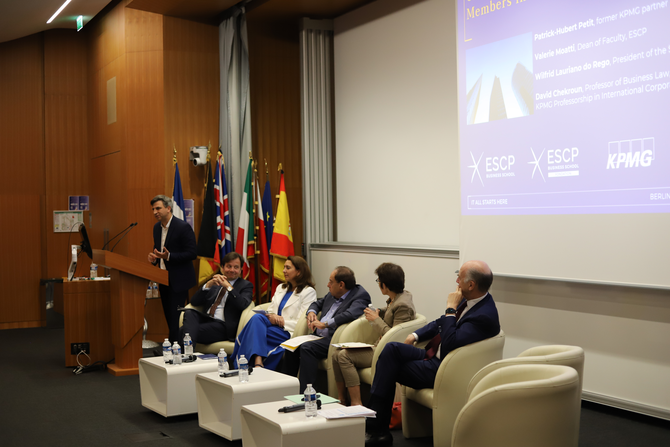PROFESSORSHIP KPMG IN INTERNATIONAL CORPORATE GOVERNANCE Challenges for Corporate Board Members in 2022
To explore company board challenges in 2022, the KPMG Professorship on International Corporate Governance organised a round-table discussion featuring experienced board members and executives with confirmed speakers Serge Weinberg, Board Chairman, Sanofi, Denis Terrien, Chairman IFA (French Institute of Directors/Institut Français des administrateurs) and CEO Salesforce South Europe, Monica de Virgiliis, Chairwoman of the Board of Directors, SNAM and Board Chair Chapter Zero France, Angeles Garcia-Poveda, Independent Chairwoman of the Board of Directors, Legrand and Lord David Gold, lawyer and founding partner of David Gold & Associates, a high-level strategic litigation advice.

Opening
The welcome and opening remarks hase been delivered by Valerie Moatti, Dean of Faculty, ESCP and Wilfrid Lauriano do Rego, President of the Supervisory Board, KPMG. And the introduction and exchanges by Patrick-Hubert Petit, Former KPMG partner, Drew Shagrin, Professor of Business Law at ESCP and David Chekroun, Professor of Business Law at ESCP and Scientific Director of the KPMG Professorship in International Corporate Governance.
Leaders shared insights
Through their conversation, these leaders shared insights about corporate governance today, and whether and how corporate governance will change in the long run.
Company boards have always faced challenges as they fulfill their somewhat constant missions. However, the specific fulfillment of those missions varies with the circumstances, and today’s circumstances are nothing short of extraordinary. From the coronavirus crisis to rapid societal changes, from the increasing importance of ESG considerations to cybersecurity threats, and from geopolitical uncertainty to the slowdown of globalization, how are company boards adapting?
Watch the replay of this conference
Interviews
Watch also the interviews with Serge Weinberg, Angeles Garcia-Poveda, Denis Terrien, Monica de Virgiliis and Lord David Gold
Serge Weinberg
Angeles Garcia-Poveda
Denis Terrien
Monica de Virgiliis
Lord David Gold
Workshops
Before the conference, the KPMG Professorship in International Corporate Governance has organised workshops to deep dive into two topics:
Corporate Governance & Geopolitics
This interactive workshop examined the tools and methods for measuring, adapting to, and communicating about geopolitical risk: what company boards have done in the past; how the context for such board processes is changing; and how the tools and methods ought to change in response to the changing context. The workshop will begin, though, with an exploration of what constitutes geopolitical risk, and how it differs from, and overlaps with, other forms of risk that company boards are expected to assess.
Workshop led by Spyros Maniatis, Director of the British Institute for International Comparative Law as well as a former Professor of Commercial Law, and Drew Shagrin, Professor of Business Law at ESCP, with the participation of Maxime Lefebvre, Professor of International Relations at ESCP as well as a former ambassador.
Corporate Governance & Human Rights
This workshop aimed at addressing how businesses could reconcile human rights and environmental concerns into their due diligence processes, into their operations and throughout their value chains, so as to prevent silos and integrate their assessments and responses to prevent and minimize them.
The effective protection of human rights and the environment for the accomplishment of a sustainable global economy has been established as an imperative by States through foundational multilateral instruments - particularly the 2011 United Nations Guiding Principles on Businesses and Human Rights (UNGPs), the 2015 UN Sustainable Development Goals (SDGs) and the 2015 Paris Agreement on Climate Change. To reach an impact at scale
– which includes the mitigation of the current climate change emergency, limiting global warming to 1.5°C limit set forth in the Paris Agreement - substantive concerted efforts by major actors, particularly States and businesses (including financial institutions), are needed at a global level.
States have to set in place the necessary policy and legal framework, as well as ensure its implementation (Pillar 1 of the UNGPs). Businesses are required to ensure the protection of human rights in their activities through due diligence (Pillar 2 of the UNGPs). Due diligenceon hu man rights has been expanded by other international instruments - most notably the OECD Guidelines for Multinational Enterprises - to include adverse environmental impacts,among other relevant issues to be subject to due diligence by companies in the assessment of their activities.
The aforementioned instruments comprise the first-generation framework, that is,they establish a duty to protect human and environmental rights on States while assign to companies a responsibility on the matter that is dependent on voluntary engagement and self-regulation. This scenario significantly started to change in the past five years, with the increasing acknowledgment that the magnitude of these global challenges requires a concerted, active collective effort. As a result, countries have increasingly promulgated mandatory due diligence laws at the national level, mainly in Europe.4 Expanding from it, in February 2022 the European Commission published its proposal for a Directive on Corporate Sustainability Due Diligence, aimed to harmonize the legal framework on the matter within the EU, while seeking to scale private action to address adverse human rights and environmental impacts by regulating, monitoring and sanctioning of companies in case of failure to comply with the provisions. The proposal is meant to be applied to high-impact sectors and to very large businesses (whether EU or foreign companies doing business in the EU), taking into account potential and actual human rights and environmental impacts of theiractivities. As the proposal will produce effects beyond EU borders, it is expected that other jurisdictions will incorporate similar provisions in their regulatory frameworks, as it has occurred with other domains such as data privacy, following the EU General Data Protection Regulation (GDPR).
Workshop moderated by Valéria Silva (affiliate Professor of law, ESCP Business School), Charlotte Michon (Executive Officer at EDH and Founder of DDH Enterprises) & David Chekroun (Professor of law, ESCP Business School - KPMG Professor in New Generation Management)
Campuses
